hairball support

free shipping over $100 (USA & Canada)
1-877-937-4372 the pet expert hotline

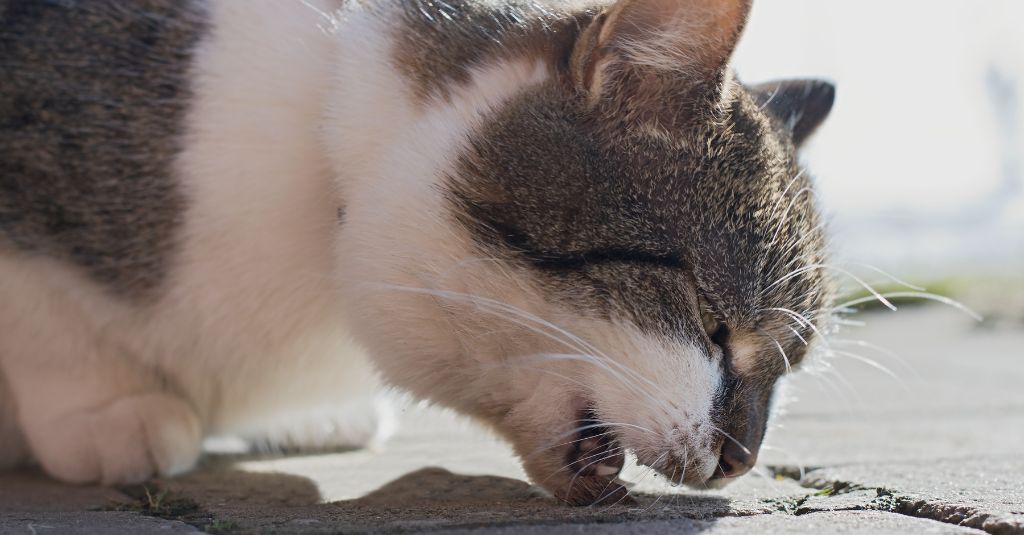
If you are asking yourself: “why is my cat vomiting” know that there are several possible reasons. Hairballs, intestinal parasites, gastrointestinal disorders, diseases, or eating habits can all cause your furkiddo to throw up. Keeping tabs on when it happens and the content of the vomit can help your trusted vet pinpoint the root cause. Here are some questions to keep in mind:
It’s important to differentiate vomiting from regurgitation when you’re discussing the symptoms with your veterinarian since their causes are different. Vomiting ejects digested contents from the stomach and upper small intestine. Regurgitated content, on the other hand, comes from the esophagus.
Regurgitation is a passive motion that relatively doesn’t require effort or contraction of the abdominal muscles. This type of ejection typically occurs right after eating or drinking, and the expelled content tends to be undigested. Cats that eat too fast may also vomit right after their meal. When they eat too quickly, they can end up swallowing air along with their food, which can cause puking.
The content that comes out from your cat’s mouth can also help your vet identify the possible cause. If your cat vomits clear or white foam frequently, it may be a sign of an underlying medical condition. Cats can also vomit a foam and/or yellow bile due to an empty stomach for a long period of time. If so, try to feed smaller meals more often throughout the day. Lastly, finding pieces of fur might indicate that your kitty is suffering from hairballs, whereas worms might indicate a parasite infestation.
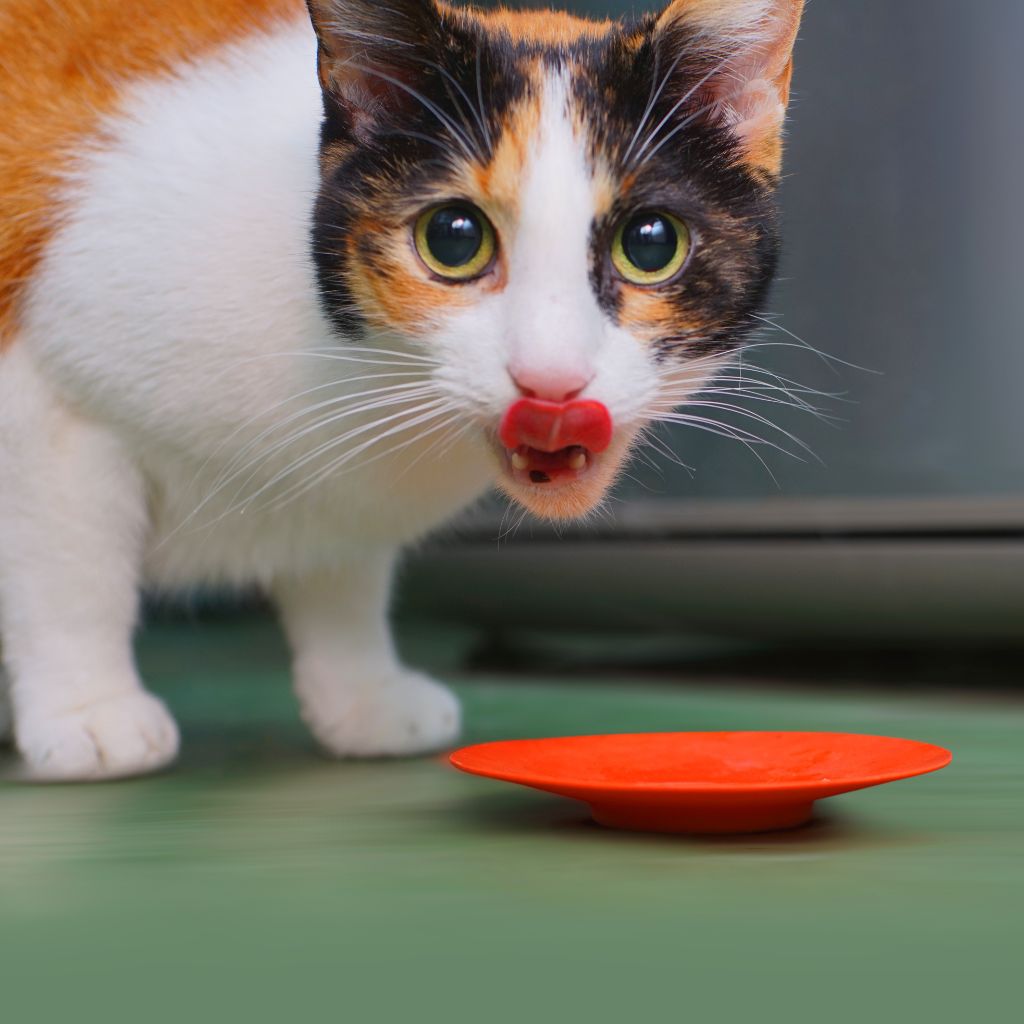
Cats are fastidious groomers, and they often ingest hair during the process. Hairballs can cause irritation and discomfort in your cat’s stomach, leading to vomiting or regurgitation. Depending on how furry your furbaby is and how is their grooming habit, furballs can happen more often. However, as a rule of thumb, if a cat has hairballs more than once a week, check with your veterinarian for underlying conditions.
Hairballs can cause irritation and discomfort in your cat’s stomach, leading to vomiting or regurgitation.
In the meantime, NHV Hairb-EZ may help to deal with and break down hairballs. This natural supplement can also be used for proactive support, as it can help unblock loose hair and keep it from forming into balls that become lodged in your cat’s stomach.
For intestinal parasites, NHV Inulin-PK acts as a natural pet deworming support. Pets dealing with parasites can throw out content without visible worms. If you want to be on the safe side, Inulin-PK can be given twice a year as a proactive measure to avoid parasitic infection.
For all cases, NHV Yucca may be a great ally to help with nausea and vomiting. This super herb helps promote healthy digestion and nutrient absorption.
If you notice blood in your furkiddo’s ejected content, please get in touch with a veterinary specialist for immediate support. Cats can also vomit due to dietary indiscretion, such as eating spoiled food, plants, or foreign objects. These cases also call for urgent care.
Otherwise, you can do a few things to help while observing your little one. First, remove your cat’s food and water for a few hours to give its stomach time to settle. After a few hours without food, you can offer your cat a small amount of water. If your cat keeps the water down, you can gradually reintroduce its food, starting with small amounts and gradually increasing the portion sizes.
Monitor your kitty’s behavior and watch for other symptoms, such as lethargy or loss of appetite. If your cat continues vomiting or showing other symptoms, seek veterinary attention immediately.
Next time you think to yourself: “why is my cat vomiting”, we hope these tips can help you care for your little one! As a cat parent, it is essential to always monitor their behavior and seek veterinary attention if you notice any signs of something wrong. We are here to help you give your feline kiddo the best support!
hairball support

Natural Support for Hairballs and Digestive Health
bundle and save with pet expert kits
3 month supply for a small to medium size pet.
If your sweet fur baby is throwing up hairballs, there may be more going on than you may think. Left untreated, hairballs can affect other organs like the liver and kidneys. Give your little one the full support they need with NHV’s Hairball control kit.


If your sweet fur baby is throwing up hairballs, there may be more going on than you may think. Left untreated, hairballs can affect other organs like the liver and kidneys. Give your little one the full support they need with NHV’s Hairball control kit.

Did you know that your furkiddo spends 30% of their waking life grooming? And because of their natural habit, they tend to swallow a lot of hair! Long haired cat breeds like Main Coons, Persians, and Ragdolls are more likely to develop hairballs than their short-haired meow-sins; however, all cats can get them. If the ingested hair cannot get past your kitty's stomach and small intestine, then a hairball will form. NHV Hairball Control Kit contains Hairb-Ez, which helps to dissolve hair buildup, soothe inflammation along the GI tract and improve the motility of undigested matter, while Milk Thistle helps with detoxification, reducing oxidative stress on the liver, and supporting healthy kidney/gallbladder function.
The hacking sound of your kitty retching is pretty unpleasant to witness for any pet parent, but hairballs are a side effect of your cat's constant grooming. Suppose your furry friend is throwing up a hairball more than once a month. In that case, there may be something more serious going on like intestinal motility problems, skin issues, abdomen issues, urinary tract problems, or musculoskeletal concerns. When your kitty is grooming, their tongue is barbed (like a miniature brush), moving loose hair down their throat. Typically, this ingested hair passes through their GI tract and into their litter box. Sometimes, however, the hair can get stuck in their stomach, and they throw this up as hairballs. Hairballs become a problem when your kitty's digestive system can't move the hair through the stomach and intestinal tract at an average speed, leading to a possible blockage and issues with other organs. NHV Hairball Control Kit contains Hairb-Ez and Milk Thistle to help support your kitty's digestive health, organ health and to help pass hairballs naturally.
Hairball Control Kit is a natural healthcare support that aids with dissolving hairballs, improving GI tract health as well as support detoxification and immune function. These liquid supplements with high bioavailability are safe and effective to use alongside other hairball treatments.
At NHV, we are a team of pet experts, vets, and animal lovers. Get in touch with us if you have any questions or concerns about your kitty's unique health concerns.
Made with the finest, organically grown, or ethically harvested herbs. Made specifically for pets, vet-formulated and vet approved.
Hairb-Ez
Milk Thistle
Select your pet's weight to determine the correct dose.
To be taken twice daily. Determine your pet’s weight and then use the easy chart below to determine the correct dose. This is the minimum dosage.
Pet's Weight Dosage
0 - 15 lb = 0.5 ml
16 - 30 lb = 1.0 ml
31 - 45 lb = 1.5 ml
46 - 60 lb = 2.0 ml
61 - 75 lb = 2.5 ml
Over 75 lb = 3.0 ml
For rabbits: 0.5 ml twice a day
How to Administer
Shake well before use. The easiest method is to use the dropper provided and place the drops into your pet’s food or favorite treat. You can also use the dropper and squirt directly into the pet’s mouth. Some pets can be finicky, if this occurs consider hiding the drops in foods most pet’s love such as fish, chicken or yogurt or a favorite treat. If your pet only eats dry food then soak a few kibbles at feeding time.
For Best Results
Herbal dietary supplements are beneficial to the health and well-being of your pet and are safe for long-term use. Every pet responds to natural herbal supplements differently, therefore it is important to be consistent and administer the product daily. Supplements generally take two to four weeks to take effect, however this will vary from one animal to the next.
Product Storage
All NHV Natural Pet Products are pure herbal extracts and contain no artificial additives, preservatives or coloring. Shelf life after opening is 6 months and must be refrigerated after opening.
Cautions and Contraindications
Do not use in pregnant or nursing animals.
All information provided by NHV Natural Pet Products is for educational purposes only.
Did you know that your furkiddo spends 30% of their waking life grooming? And because of their natural habit, they tend to swallow a lot of hair! Long haired cat breeds like Main Coons, Persians, and Ragdolls are more likely to develop hairballs than their short-haired meow-sins; however, all cats can get them. If the ingested hair cannot get past your kitty's stomach and small intestine, then a hairball will form. NHV Hairball Control Kit contains Hairb-Ez, which helps to dissolve hair buildup, soothe inflammation along the GI tract and improve the motility of undigested matter, while Milk Thistle helps with detoxification, reducing oxidative stress on the liver, and supporting healthy kidney/gallbladder function.
The hacking sound of your kitty retching is pretty unpleasant to witness for any pet parent, but hairballs are a side effect of your cat's constant grooming. Suppose your furry friend is throwing up a hairball more than once a month. In that case, there may be something more serious going on like intestinal motility problems, skin issues, abdomen issues, urinary tract problems, or musculoskeletal concerns. When your kitty is grooming, their tongue is barbed (like a miniature brush), moving loose hair down their throat. Typically, this ingested hair passes through their GI tract and into their litter box. Sometimes, however, the hair can get stuck in their stomach, and they throw this up as hairballs. Hairballs become a problem when your kitty's digestive system can't move the hair through the stomach and intestinal tract at an average speed, leading to a possible blockage and issues with other organs. NHV Hairball Control Kit contains Hairb-Ez and Milk Thistle to help support your kitty's digestive health, organ health and to help pass hairballs naturally.
Hairball Control Kit is a natural healthcare support that aids with dissolving hairballs, improving GI tract health as well as support detoxification and immune function. These liquid supplements with high bioavailability are safe and effective to use alongside other hairball treatments.
At NHV, we are a team of pet experts, vets, and animal lovers. Get in touch with us if you have any questions or concerns about your kitty's unique health concerns.
Made with the finest, organically grown, or ethically harvested herbs. Made specifically for pets, vet-formulated and vet approved.
Hairb-Ez
Milk Thistle
Select your pet's weight to determine the correct dose.
To be taken twice daily. Determine your pet’s weight and then use the easy chart below to determine the correct dose. This is the minimum dosage.
Pet's Weight Dosage
0 - 15 lb = 0.5 ml
16 - 30 lb = 1.0 ml
31 - 45 lb = 1.5 ml
46 - 60 lb = 2.0 ml
61 - 75 lb = 2.5 ml
Over 75 lb = 3.0 ml
For rabbits: 0.5 ml twice a day
How to Administer
Shake well before use. The easiest method is to use the dropper provided and place the drops into your pet’s food or favorite treat. You can also use the dropper and squirt directly into the pet’s mouth. Some pets can be finicky, if this occurs consider hiding the drops in foods most pet’s love such as fish, chicken or yogurt or a favorite treat. If your pet only eats dry food then soak a few kibbles at feeding time.
For Best Results
Herbal dietary supplements are beneficial to the health and well-being of your pet and are safe for long-term use. Every pet responds to natural herbal supplements differently, therefore it is important to be consistent and administer the product daily. Supplements generally take two to four weeks to take effect, however this will vary from one animal to the next.
Product Storage
All NHV Natural Pet Products are pure herbal extracts and contain no artificial additives, preservatives or coloring. Shelf life after opening is 6 months and must be refrigerated after opening.
Cautions and Contraindications
Do not use in pregnant or nursing animals.
All information provided by NHV Natural Pet Products is for educational purposes only.
discomfort support


Support for Discomfort and Appetite Stimulant
buy 2 and save $3
3 month supply for a small to medium size
NHV Yucca is used for cats as a supplement to provide nutrients, and may be helpful for discomfort, inflammation, and to increase or balance the appetite.


NHV Yucca is used for cats as a supplement to provide nutrients, and may be helpful for discomfort, inflammation, and to increase or balance the appetite.

Yucca is used in cat food as well as food for other animals around the world. Its root is a highly nutritious herb that’s rich in vitamin C, beta-carotene, B vitamins, magnesium, iron, calcium, manganese, protein, niacin, and phosphorus.
Yucca contains two very beneficial compounds: sarsasapogenin and smilagenin. These two compounds work on the mucous membranes of the small intestine. These compounds help with the penetration and absorption of minerals and vitamins. Sarsasapogenin and smilagenin are known as steroidal saponins (phytosterols) which act as precursors to corticosteroids produced naturally by the body.
Steroidal saponins support the immune function of the body while stimulating and supporting the production of its own corticosteroids and corticosteroid–related hormones. Due to this action, studies conducted on Yucca have shown that it may be beneficial and effective for discomfort relief and inflammation in conditions such as arthritis. Yucca for cats may also be a natural appetite stimulant and may also help reduce the production of urease, which contributes to the unpleasant odors of urine and feces in some cats.
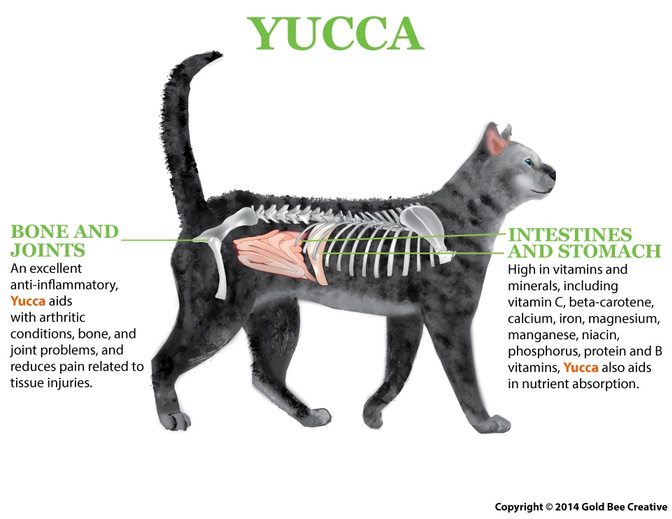
Yucca - Commonly used for supporting arthritis, as an anti-inflammatory, nutritive, antitumor, and digestive supplement.
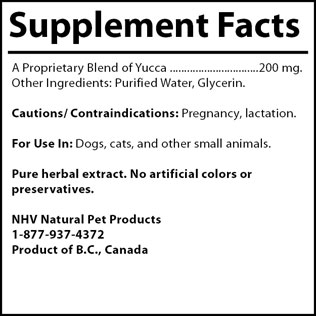
Select your pet's weight to determine the correct dose.
To be taken twice daily. Determine your pet’s weight and then use the easy chart below to determine the correct dose. This is the minimum dosage.
Pet's Weight Dosage
0 - 15 lb = 0.5 ml
16 - 30 lb = 1.0 ml
31 - 45 lb = 1.5 ml
46 - 60 lb = 2.0 ml
61 - 75 lb = 2.5 ml
Over 75 lb = 3.0 ml
How to Administer: Shake well before use. The easiest method is to use the dropper provided and place the drops into your pet’s food or favorite treat. You can also use the dropper and squirt directly into the pet’s mouth. Some pets can be finicky, if this occurs consider hiding the drops in foods most pet’s love such as fish, chicken, yogurt, or a favorite treat. If your pet only eats dry food then soak a few kibbles at feeding time.
For Best Results: Herbal dietary supplements are beneficial to the health and well-being of your pet and are safe for long-term use. Every pet responds to natural herbal supplements differently, therefore it is important to be consistent and administer the product daily. Supplements generally take two to four weeks to take effect, however this will vary from one animal to the next.
Product Storage:
All NHV Natural Pet Products are pure herbal extracts and contain no artificial additives, preservatives or coloring. Shelf life after opening is 6 months and must be refrigerated after opening.
Cautions and Contraindications
Do not use Yucca in pregnant or nursing animals.
Speak to your vet before using our products. A second visit is recommended if your pet’s condition does not improve, or deteriorates after continued use of the supplements. All information provided by NHV Natural Pet Products is for educational purposes only.
Yucca is used in cat food as well as food for other animals around the world. Its root is a highly nutritious herb that’s rich in vitamin C, beta-carotene, B vitamins, magnesium, iron, calcium, manganese, protein, niacin, and phosphorus.
Yucca contains two very beneficial compounds: sarsasapogenin and smilagenin. These two compounds work on the mucous membranes of the small intestine. These compounds help with the penetration and absorption of minerals and vitamins. Sarsasapogenin and smilagenin are known as steroidal saponins (phytosterols) which act as precursors to corticosteroids produced naturally by the body.
Steroidal saponins support the immune function of the body while stimulating and supporting the production of its own corticosteroids and corticosteroid–related hormones. Due to this action, studies conducted on Yucca have shown that it may be beneficial and effective for discomfort relief and inflammation in conditions such as arthritis. Yucca for cats may also be a natural appetite stimulant and may also help reduce the production of urease, which contributes to the unpleasant odors of urine and feces in some cats.

Yucca - Commonly used for supporting arthritis, as an anti-inflammatory, nutritive, antitumor, and digestive supplement.

Select your pet's weight to determine the correct dose.
To be taken twice daily. Determine your pet’s weight and then use the easy chart below to determine the correct dose. This is the minimum dosage.
Pet's Weight Dosage
0 - 15 lb = 0.5 ml
16 - 30 lb = 1.0 ml
31 - 45 lb = 1.5 ml
46 - 60 lb = 2.0 ml
61 - 75 lb = 2.5 ml
Over 75 lb = 3.0 ml
How to Administer: Shake well before use. The easiest method is to use the dropper provided and place the drops into your pet’s food or favorite treat. You can also use the dropper and squirt directly into the pet’s mouth. Some pets can be finicky, if this occurs consider hiding the drops in foods most pet’s love such as fish, chicken, yogurt, or a favorite treat. If your pet only eats dry food then soak a few kibbles at feeding time.
For Best Results: Herbal dietary supplements are beneficial to the health and well-being of your pet and are safe for long-term use. Every pet responds to natural herbal supplements differently, therefore it is important to be consistent and administer the product daily. Supplements generally take two to four weeks to take effect, however this will vary from one animal to the next.
Product Storage:
All NHV Natural Pet Products are pure herbal extracts and contain no artificial additives, preservatives or coloring. Shelf life after opening is 6 months and must be refrigerated after opening.
Cautions and Contraindications
Do not use Yucca in pregnant or nursing animals.
Speak to your vet before using our products. A second visit is recommended if your pet’s condition does not improve, or deteriorates after continued use of the supplements. All information provided by NHV Natural Pet Products is for educational purposes only.
worm and parasite support
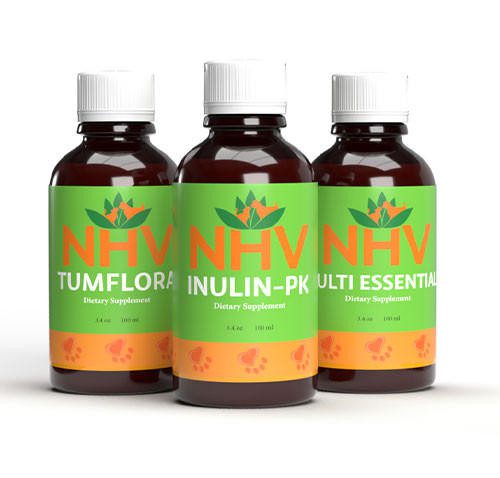
TumFlora, Inulin-PK, Multi Essentials
bundle and save with pet expert kits
3 month supply for a small to medium size pet
Did you know that regularly deworming dogs and cats is vital in keeping your furkiddo happy and healthy? It may help prevent parasitic intruders from taking over your little one’s body! NHV’s Worm and Parasite Super Recovery Kit offers gentle support for parasite-infected dogs and cats in addition to conventional medication or as proactive care before an infection.

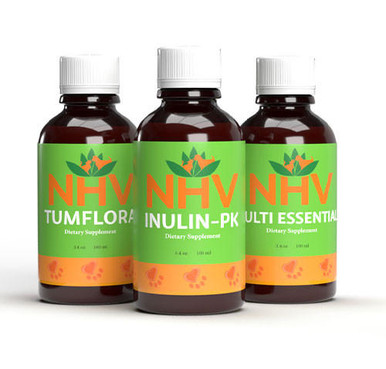
Did you know that regularly deworming dogs and cats is vital in keeping your furkiddo happy and healthy? It may help prevent parasitic intruders from taking over your little one’s body! NHV’s Worm and Parasite Super Recovery Kit offers gentle support for parasite-infected dogs and cats in addition to conventional medication or as proactive care before an infection.

Seeing your precious furbaby suffer from parasite infestation is worrying and unsettling. That’s why we recommend deworming dogs and cats every three months when they’re over six months old. Our Worm and Parasite Super Recovery Kit can help your little one deworm, ease symptoms of parasite infestation, and help restore the damage worms cause. This bundle contains our primary support for gastrointestinal health – TumFlora, Multi Essentials, and Inulin-PK.
All our supplements are free of added preservatives, additives, flavorings, or artificial colors. They are made with organically grown and ethically harvested (or ethically sourced) herbs.
What are Parasites in Dogs and Cats?
During daily exploration, your furbaby can easily come in contact with objects that contain worms. This could be soil, poop, or even dead animals. These worms enter your pet’s body when they lick their paws or put these objects in their mouths.
Worms are unavoidable to your pets. Left untreated, they can also lead to dire consequences, such as damaging the GI tract, malabsorption, or even causing death in extreme cases.
Symptoms of Worms in Dogs and Cats
How can you tell if an alarming number of worms have infiltrated your furkiddos body? There are a few common signs you should look out for:
It is important to note that some dogs and cats do not show any of these signs. The symptoms usually only reveal themselves when their condition gets severe or starts causing different health issues. That’s why we recommend you deworm your furkiddos regularly and visit a licensed veterinarian for a full body examination and possibly a fecal exam. Press pause well before the infestation gets serious.
Treatment for Deworming Dogs and Cats
If the parasite situation gets out of hand, your furkiddo will need conventional dewormer medication. The medication they need depends on the types of worms they have. Your veterinarian can recommend the medication most apt for your little one.
How NHV Remedies Support Deworming Dogs and Cats
Our Worm and Parasite Super Recovery Kit can support your furkiddo while taking dewormer medication.
Inulin-PK provides basic support as it may provide helpful support for deworming dogs and cats in the early stages of infestation. Herbs like Wormwood, Papaya, and Jamaica Quassia, help expel parasites from your furkiddo’s body. This supplement also may help strengthen your furkiddo's immune system and repair the damage caused by parasites.
And what kind of damage is it? You may ask.
Parasites feed off the tissues in your furkiddo's gastrointestinal (Gi) tract to survive and grow. This results in gastrointestinal damage and digestive problems in dogs and cats. Inulin-PK can help by promoting gastrointestinal health and relieving indigestion. Ingredients like Licorice also help alleviate tissue damage in the upper digestive tract.
TumFlora can also help ease gastrointestinal problems in cats and dogs, such as soothing symptoms of IBD (inflammatory bowel disease). This gentle supplement supports overall gut health, helps heal the digestive tract, and helps absorb nutrients from food.
Last but not least, Multi Essentials offers additional support your little one needs to get through this tough time. It is a great source of protein, vitamins, and minerals that provides plenty of nutrients for your furkiddo. On top of that, the herbs like Oregon Grape may help reduce inflammation in the digestive system.
Inulin-PK
TumFlora
Multi Essentials
Natural Support for Deworming Dogs and Cats
NHV’s supplements are all manufactured in a GMP-certified and FDA-approved facility. On top of that, a third-party lab has tested them for quality assurance. Therefore, you can rest assured that our products are safe for your little one.
Your furkiddo's health and well-being are our top priorities. Because of that, we have a very dedicated and supportive team of pet experts to help. Feel free to connect with one of NHV’s pet experts if you have any questions at all!
Grappling with parasitic infections can be very tough on your furkiddo. Order our Worm and Parasite Super Recovery Kit right now to support their fight!
All NHV supplements are made with the finest quality organic or ethically harvested herbs. We use non-GMO vegetable glycerin as our base. NHV products are full-spectrum extracts.
TumFlora
Inulin-PK
Multi Essentials
Select your pet's weight to determine the correct dose.
To be taken twice daily. All NHV supplements are designed to be used together, and can therefore be given at once for convenience.
Maintenance Dosage
1 drop for every 2 lb of body weight twice a day up to 50 lb. This is the minimum dosage. We recommend using this dosage when the supplements are being used as proactive care or for general health. When addressing a condition, we recommend using the therapeutic dosage (see below).
Determine your pet’s weight and then use the chart below to determine the correct dose.
Pet's Weight Dosage (twice daily)
0 - 15 lb 0.5 mL
16 - 30 lb 1.0 mL
31 - 45 lb 1.5 mL
46 - 60 lb 2.0 mL
61 - 75 lb 2.5 mL
Over 75 lb 3.0 mL
How to Administer
Shake well before use. The easiest method is to use the dropper provided and squirt directly into the pet’s mouth or add the correct dosage to your pet's food or favorite treat.
Some pets can be finicky, if this occurs consider hiding the drops in foods most pet’s love such as fish, chicken or yogurt or a favorite treat. If your pet only eats dry food then soak a few kibbles at feeding time.
For Best Results
Herbal dietary supplements are beneficial to the health and wellbeing of your pet and are safe for long-term use. Every pet responds to natural herbal supplements differently, therefore it is important to be consistent and administer the product daily. Supplements generally take two to four weeks to take effect, however this will vary from one animal to the another.
Product Storage
All NHV Natural Pet Products are pure herbal extracts and contain no added artificial additives, preservatives or coloring. Shelf life after opening is 6 months and must be refrigerated after opening
Seeing your precious furbaby suffer from parasite infestation is worrying and unsettling. That’s why we recommend deworming dogs and cats every three months when they’re over six months old. Our Worm and Parasite Super Recovery Kit can help your little one deworm, ease symptoms of parasite infestation, and help restore the damage worms cause. This bundle contains our primary support for gastrointestinal health – TumFlora, Multi Essentials, and Inulin-PK.
All our supplements are free of added preservatives, additives, flavorings, or artificial colors. They are made with organically grown and ethically harvested (or ethically sourced) herbs.
What are Parasites in Dogs and Cats?
During daily exploration, your furbaby can easily come in contact with objects that contain worms. This could be soil, poop, or even dead animals. These worms enter your pet’s body when they lick their paws or put these objects in their mouths.
Worms are unavoidable to your pets. Left untreated, they can also lead to dire consequences, such as damaging the GI tract, malabsorption, or even causing death in extreme cases.
Symptoms of Worms in Dogs and Cats
How can you tell if an alarming number of worms have infiltrated your furkiddos body? There are a few common signs you should look out for:
It is important to note that some dogs and cats do not show any of these signs. The symptoms usually only reveal themselves when their condition gets severe or starts causing different health issues. That’s why we recommend you deworm your furkiddos regularly and visit a licensed veterinarian for a full body examination and possibly a fecal exam. Press pause well before the infestation gets serious.
Treatment for Deworming Dogs and Cats
If the parasite situation gets out of hand, your furkiddo will need conventional dewormer medication. The medication they need depends on the types of worms they have. Your veterinarian can recommend the medication most apt for your little one.
How NHV Remedies Support Deworming Dogs and Cats
Our Worm and Parasite Super Recovery Kit can support your furkiddo while taking dewormer medication.
Inulin-PK provides basic support as it may provide helpful support for deworming dogs and cats in the early stages of infestation. Herbs like Wormwood, Papaya, and Jamaica Quassia, help expel parasites from your furkiddo’s body. This supplement also may help strengthen your furkiddo's immune system and repair the damage caused by parasites.
And what kind of damage is it? You may ask.
Parasites feed off the tissues in your furkiddo's gastrointestinal (Gi) tract to survive and grow. This results in gastrointestinal damage and digestive problems in dogs and cats. Inulin-PK can help by promoting gastrointestinal health and relieving indigestion. Ingredients like Licorice also help alleviate tissue damage in the upper digestive tract.
TumFlora can also help ease gastrointestinal problems in cats and dogs, such as soothing symptoms of IBD (inflammatory bowel disease). This gentle supplement supports overall gut health, helps heal the digestive tract, and helps absorb nutrients from food.
Last but not least, Multi Essentials offers additional support your little one needs to get through this tough time. It is a great source of protein, vitamins, and minerals that provides plenty of nutrients for your furkiddo. On top of that, the herbs like Oregon Grape may help reduce inflammation in the digestive system.
Inulin-PK
TumFlora
Multi Essentials
Natural Support for Deworming Dogs and Cats
NHV’s supplements are all manufactured in a GMP-certified and FDA-approved facility. On top of that, a third-party lab has tested them for quality assurance. Therefore, you can rest assured that our products are safe for your little one.
Your furkiddo's health and well-being are our top priorities. Because of that, we have a very dedicated and supportive team of pet experts to help. Feel free to connect with one of NHV’s pet experts if you have any questions at all!
Grappling with parasitic infections can be very tough on your furkiddo. Order our Worm and Parasite Super Recovery Kit right now to support their fight!
All NHV supplements are made with the finest quality organic or ethically harvested herbs. We use non-GMO vegetable glycerin as our base. NHV products are full-spectrum extracts.
TumFlora
Inulin-PK
Multi Essentials
Select your pet's weight to determine the correct dose.
To be taken twice daily. All NHV supplements are designed to be used together, and can therefore be given at once for convenience.
Maintenance Dosage
1 drop for every 2 lb of body weight twice a day up to 50 lb. This is the minimum dosage. We recommend using this dosage when the supplements are being used as proactive care or for general health. When addressing a condition, we recommend using the therapeutic dosage (see below).
Determine your pet’s weight and then use the chart below to determine the correct dose.
Pet's Weight Dosage (twice daily)
0 - 15 lb 0.5 mL
16 - 30 lb 1.0 mL
31 - 45 lb 1.5 mL
46 - 60 lb 2.0 mL
61 - 75 lb 2.5 mL
Over 75 lb 3.0 mL
How to Administer
Shake well before use. The easiest method is to use the dropper provided and squirt directly into the pet’s mouth or add the correct dosage to your pet's food or favorite treat.
Some pets can be finicky, if this occurs consider hiding the drops in foods most pet’s love such as fish, chicken or yogurt or a favorite treat. If your pet only eats dry food then soak a few kibbles at feeding time.
For Best Results
Herbal dietary supplements are beneficial to the health and wellbeing of your pet and are safe for long-term use. Every pet responds to natural herbal supplements differently, therefore it is important to be consistent and administer the product daily. Supplements generally take two to four weeks to take effect, however this will vary from one animal to the another.
Product Storage
All NHV Natural Pet Products are pure herbal extracts and contain no added artificial additives, preservatives or coloring. Shelf life after opening is 6 months and must be refrigerated after opening
Published: April 11, 2023